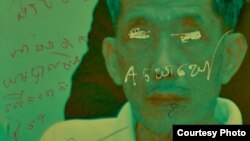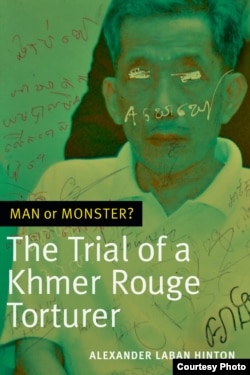Editor’s Note: A leading genocide expert, Dr. Alexander L. Hinton is a professor of anthropology at Rutgers University, Newark, and director of the Center for the Study of Genocide and Human Rights and UNESCO chair at Rutgers. His latest book, “Man or Monster? The Trial of a Khmer Rouge Torturer”, is a study not just of Comrade Duch, the notorious chief of the S-21 Security Center in Phnom Penh, thousands were tortured and starved to death, but of why people resort to extreme violence and dehumanize others. Dr. Hinton spoke to VOA Khmer reporter Sopheada Phy by telephone.
VOA: What are the issues mainly discussed in your book?
AH: The issues are reflected by the title of the book, “Man or Monster? The Trial of the Khmer Rouge Torturer”. But more basically, the book is about Duch, his past torture, the prison that he ran – S -21, which is now Tuol Sleng – the court that tried him, and, in some sense, the meaning of justice. But more broadly, the book is also a story about what it means to be human, and how his story may not be very so far from our own since the ways of categorizing other human beings in reductive ways is part of our everyday life.
What can readers learn from you book?
Well, in one sense, in terms of history and anthropology, the book is about Duch as a person, and the path that took him to S-21 and to be tried at the Khmer Rouge Tribunal. The book also considers the tribunal itself and the juridical process that led ultimately to conviction, and also speaks more broadly to Cambodian history and the genocide that took place there. But again, going back to the title of the book, “Man or Monster?” in some sense, it is the question that we pose about him, but it is also the question that says something about ourselves. By viewing him in this way, we are engaging in the same sort of reductive thinking that a perpetrator uses to view victims.
I 'd just like to elaborate a little bit. The cover of the book comes from the photograph that was defaced at Tuol Sleng museum that is now on site of S-21, and people had inscribed graffiti, using words like “evil”, “going to the Buddhist hell”, and different things. And again, I was really struck by this because it shows that we can very easily slip into the same reductive type of thinking that is taken to the extreme in a place like S-21 and the torture chamber, where complex human beings are described in a very reductive way, and in doing so, it makes it easier to harm other human beings, what I refer to as the banality of everyday thought.
You use this term “banality of everyday thought” in the book. What do you mean by this?
Scholars who have looked at different causes or factors that lead to genocide or mass violence, some of the common ones, you tend to have genocide in a context of upheaval, you tend to have genocide in a context of polarization as well, and you have a situation, in which you have an ideology of hate that’s operative. So, you have these general backdrops in a context of Democratic Kampuchea, what preceded it: you have the civil war, you have the larger backdrop of the conflict in Vietnam, you have economic upheaval that had taken place. In such situations, often people look for other messages of meaning, and ideologues offer these messages. Paradoxically and ironically, they are often driven by things like social justice. But, thinking specifically about Democratic Kampuchea, they [Khmer Rouge leaders] had the desire, in one sense, to make the world a better place.
What would justice look like for the Cambodian survivors of the regime?
That is a complicated question. I would say, I would never want to answer for Cambodians. Of course, that’s for Cambodians to decide, and also it is an individual question, in some sense, so each person has to answer that for themselves. But, more broadly, [with] people that I have spoken to, there seems to be a genuine desire to have justice of a sort. What justice means is a broader question, and people also answered that differently. But, some sort of accounting – holding accountable of people who committed the violence that took place during Democratic Kampuchea – in some sense, holding them accountable, and also coming to understand why this event took place. It also gets to the question “what does justice mean?” and people define justice in different sorts of ways. The notion of legalistic justice – justice that is exacted or undertaken in accordance with the rule of law with a higher standard -- Hannah Arendt herself referred to this sort of legalism. With regard to the question about the senior leaders of the Khmer Rouge, people answer in different ways. I think it’s clear that it will be impossible to try all of former Khmer Rouge. For example, in Rwanda, it took far too long [so they] used a form of community justice. So, that would be one possibility in Cambodia, perhaps that something like that, but it looks like that it’s not going to happen.
So do you think that the Khmer Rouge Tribunal has been partly successful?
Oh yes. I think you would never find any tribunal anywhere that has ever been completely successful. With international justice that is placed into a context that is highly political, and they are always politicized to some extent, the question is “to what extent?” So again, I would say there is no such thing as perfect justice. The ECCC delivers at least a qualified justice and that justice is better than no justice.
Some observers have questioned whether the Tribunal is important to Cambodians. What do you think?
It’s a good question. In some sense, if I reverse it and say would you be surprised if every single person in Cambodia were incredibly interested in the work of the tribunal? That to me would be remarkable. I live in the United States, which just had an election, and in that election, half of the people didn’t vote. Half of the people, for different reasons, chose not to vote. There are short term and long term goals. The long term goal [involved] these two things: the legalistic goal of holding people accountable, and the didactic goal – teaching people lessons. I would be surprised if people weren’t concerned about their livelihood, as it is absolutely critical. The outcomes of international justice are often exaggerated. There is a real problem with managing expectation, and I think people recognize that the trial can take certain limited steps towards having people get some sort of justice, but also to promote [a degree] of reconciliation and increase understanding. If you have limited goals, the qualified justice that the ECCC may provide, that’s there for people, even if there has been clear controversy that needs to be taken into account that undermines some of the legitimacy of the court.
Do you think people are moving on while they are still traumatized?
I don’t think we have a situation that is sometimes presented where Cambodians since 1979 have been living in a state of trauma, unable to come to terms with the past. I think that, very much otherwise, many Cambodians, who have gone on with their lives in different ways, [have] coped with the past. It is clear that some people have trauma, but I don’t think by any means the majority of people. Sometimes the media in different places depicts it in this manner. This [tribunal] is part of a process that began back in 1979, continues into the present, and may well go on into the future. With educational efforts, for example, the teaching about the genocide through the Documentation Center of Cambodia, the undertaking of different initiatives done by civil society, some reparation projects potentially that would go on to the future. It’s one step. It’s not the only step. There have been a number of steps that have been taken before this. There will be a number of steps that will be taken after this. This is one step in a process. We can appreciate what the court has achieved, even though we see the problems that have emerged and need to be recognized and discussed as well.
Do you have any final thoughts?
I hope it [the book] is translated into Khmer. That would be a great honor if that would be the case because people in Cambodia can read it. It’s only available in English right now. As I said, besides having this lesson about history, it also has a lesson about what it means to be a human being, one that resonates with Buddhism in a sense that you have the ego and the desire to buttress the ego that leads to [suffering]. But, again, the notion of effacement – effacing conviction – is the idea that we need to acknowledge other human beings by trying as best as we can, not to think in rigid way about other people. Because [doing so is one] of the seeds of mass violence and genocide.
Note: This interview was edited for length and clarity.






